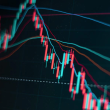by Schwab Center for Financial Research
The equity markets remained volatile as they wrestle with an aggressive Fed, which has signaled that restoring price stability is its number one goal and conceding that the path to a soft landing has become "more challenging."
Amid this market backdrop, Schwab's Chief Investment Strategist, Liz Ann notes in her article, Panic Is Not a Strategy—Nor Is Greed, how disciplined investing helps investors navigate through volatile environments. You can follow Liz Ann on Twitter: @LizAnnSonders.
Read all our market commentary on our Insights & Education page, and you can follow us on Twitter at @SchwabResearch.
In earnings news, Dow member Nike Inc. (NKE $103) reported fiscal Q4 earnings-per-share (EPS) of $0.90, including several non-recurring charges, notably due to its deconsolidation of its Russian operations, and compared to the FactSet EPS estimate of $0.80. Revenues declined 1.0% year-over-year (y/y) to $12.2 billion, above the Street's forecast of $12.1 billion. The company saw growth in its Nike direct revenues in most regions, but it was partially offset by a decline in China and the strength in the U.S. dollar had a negative impact. The company said its gross margin decreased 80 basis points (bps), primarily due to higher inventory obsolescence reserves in Greater China and elevated freight and logistics costs, partially offset by strategic pricing actions. NKE authorized a new 4-year $18.0 billion share repurchase program. Shares of NKE traded lower.
The Financials sector was in focus, as last week the Federal Reserve gave the green light to major banks' plans following the 2022 stress tests on the industry, which were instituted following the 2008 financial crisis and is a measure that ensures that banks could withstand any similar shock in the future. The results showed that all 34 of the major lenders cleared the hurdles and would collectively suffer $612 billion in losses under the test's hypothetical scenario of a severe downturn. In the wake of the outcome, a number of the major banks announced their intentions to raise their quarterly dividend, notably Dow member Goldman Sachs Group Inc.(GS $299), Bank of America Corp. (BAC $32), Wells Fargo & Company (WFC $40) and Morgan Stanley (MS $78). Surprising the Street, Dow component JPMorgan Chase & Co.(JPM $116) and Citigroup Inc. (C $47) opted for no change to their respective dividends. MS finished higher, while all the other banks traded lower.
Home prices continue to rise but Consumer Confidence falls again
The Richmond Fed Manufacturing Activity Index surprisingly fell deeper into contraction territory (a reading below zero) for June, plunging to -19 from May's -9 reading, and well below forecasts for a reading of -7. New order volume and shipments dropped further into contraction territory, while prices paid decelerated but remained severely elevated.
The 20-city composite S&P CoreLogic Case-Shiller Home Price Index showed a 21.2% y/y gain in home prices in April, above the Bloomberg consensus estimate of an 21.1% rise. Compared to the prior month, home prices were up 1.8% on a seasonally adjusted basis, compared to forecasts of a 1.9% gain.
Schwab's Liz Ann Sonders discusses the housing market in her latest article, Can't Find My Way Home, noting how a spike in prices and interest rates has dealt a significant blow to housing affordability, elevating the potential for the housing market's weakness to dampen economic growth.
The advance goods trade balance showed that the May deficit narrowed more than expected to $104.3 billion, versus estimates calling for it to contract to $104.8 billion from April's upwardly-revised shortfall of $106.7 billion.
Preliminary wholesale inventories rose 2.0% month-over-month (m/m) for May, compared to expectations of a 2.1% gain, and versus April's upwardly-revised 2.3% increase.
Later this morning, the economic calendar will bring the release of the Conference Board's Consumer Confidence report, forecasted to drop to 100.0 in June from May's 106.4 level. Lastly, we will get the release of the Richmond Fed Manufacturing Index for June, forecasted to improve to a reading of -7 from May's -9 level, though a reading below zero denotes contraction in activity.
Treasuries are little changed after last week's decline as action in the bond markets remains choppy. The volatility has come as the markets grapple with the economic implications of an aggressive Fed to fight persistent inflation, with recession uncertainty rising. Financial conditions have tightened amid the uneasiness and market skittishness has been exacerbated by the prospect of the Fed tightening policy amid the backdrop of a slowing economy.
For more on the Fed's actions check out our WashingtonWISE podcast, Fed Gets Aggressive: What's It Mean for Investors?, featuring Schwab's Chief Fixed Income Strategist Kathy Jones. Also, be sure to follow Kathy on Twitter: @KathyJones.
The yield on the 2-year Treasury note was up 1 bp to 3.14%, while the yields on the 10-year note and 30-year bond were flat at 3.20% and 3.30%, respectively.
The economic calendar for tomorrow will hold the final look (of three) at Q1 Gross Domestic Product (GDP), with economists projecting no revision to the 1.5% quarter-over-quarter (q/q) annualized rate of contraction, as well as no change to the prior 3.1% q/q rise in Personal Consumption. Both the GDP Price Index and the Core PCE Index are expected to remain at their respective q/q increases of 8.1% and 5.1%. The MBA Mortgage Applications Index for the week ended June 24 is also slated for release.
Europe mostly higher despite lingering headwinds
The U.K. FTSE 100 Index and Spain's IBEX 35 Index were up 0.9%, France's CAC-40 Index rose 0.6%, Germany's DAX Index gained 0.4%, Italy's FTSE MIB Index advanced 0.8%, while Switzerland's Swiss Market Index traded 0.9% lower.
Asia adds to yesterday's gains
Japan's Nikkei 225 Index rose 0.7%, with the yen continuing to stabilize after a noticeable plunge versus the U.S. dollar as the Bank of Japan lags behind central banks in North America and Europe. China's Shanghai Composite Index and the Hong Kong Hang Seng Index both gained 0.9%. Australia's S&P/ASX 200 Index also advanced 0.9%, India's S&P BSE Sensex 30 Index was as little changed, and South Korea's Kospi Index increased 0.8%.
The international economic calendar for tomorrow will offer retail sales and trade data from Japan, housing prices from the U.K., CPI from Spain, and confidence figures from the Eurozone.
Copyright © Schwab Center for Financial Research














